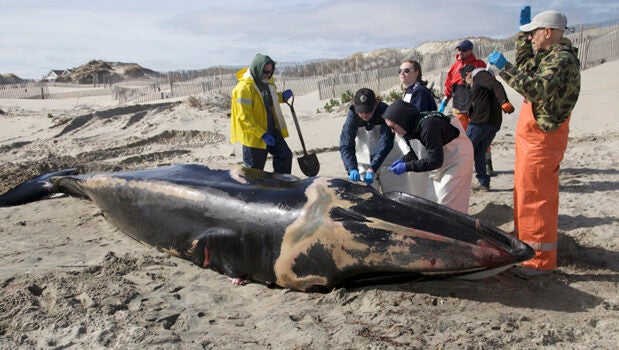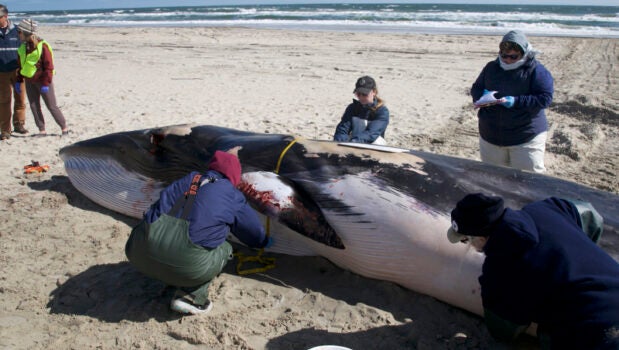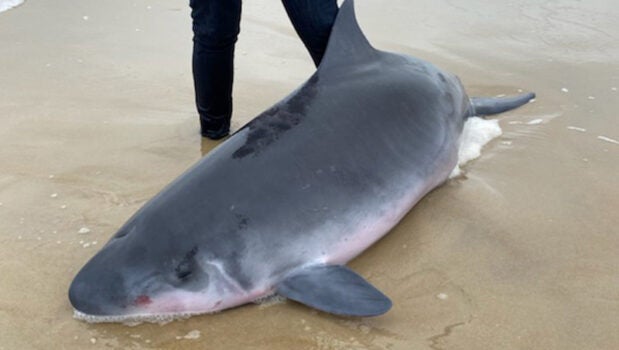Infectious disease the culprit for one out three beached whales found on OBX this month
Published 2:52 pm Wednesday, March 20, 2024
|
Getting your Trinity Audio player ready...
|
A dwarf sperm whale calf was found beached to the north side of Jennette’s Pier on Friday, March 8, just hours before his mother washed ashore. A few days prior, a minke whale was found stranded on the four-wheel-drive beach outside of Corolla. While histology reports are yet to be completed, the Marine Mammal Stranding Network (MMSN) has stated the cause of death for one of the three was infectious disease.
A stranding report came in on Tuesday, March 5 about a beached minke whale which had washed up on the shores of Carova. A 26-foot female minke showed no external signs of trauma but appeared unusually thin. The animal was swept away by the current but showed back up about four-and-a-half miles north on March 7 and was anchored to the beach overnight due to high tides. On Friday, MMSN was able to complete a necropsy and has determined that the whale was suffering from an infection.
Blair Mase, NOAA’s southeast region marine mammal stranding coordinator, explained the “huge mortality event” that has been ongoing with humpback and minke whales since 2016. “Of the carcasses, there’s a high percentage of these animals with infectious disease,” she said. Due to the compromised condition of the minke whale and gross assessments, the vets were in agreement that such was the case for this particular animal. “We would need to wait for the histology results to confirm everything, but grossly, they said that it looked like there was infectious disease in this whale.”
Responders were also called down to Nags Head on that same Friday due to a beached calf of the dwarf sperm whale species. It appeared that the young male had followed its mother and, unfortunately, both ended up on the shore. The dependent yearling had to be euthanized because there are no rehabilitation options in the state of North Carolina for these animals, especially ones that are dependent on their mothers for survival.
“They’re an offshore species,” said Marina Doshkov, Jennette’s Pier stranding coordinator. “A lot of thought goes into putting the animal down at that point.” Mase shared that the decision to euthanize is based on an evaluation of condition by experts; if the condition of the animal is compromised, the best course of action is to ease suffering by humanely euthanizing the animal. She added that for a dependent calf, it’s like sending a newborn onto the streets without its mother. “It’s just not an option to do a beach release and send the animal back out into the wild.”
The calf’s mother, a pregnant dwarf sperm whale, was reported around 5 p.m. that same evening near E. Barnes Street in Nags Head. The MMNS team performed a necropsy on the mother, who was reported to have shown signs of illness. They are still waiting on results from histology – which should take about a month – to determine if in fact the female was suffering from an illness.
Reasons as to why whales wash ashore vary. Mase said “it’s a mixed bag.” There are some animals that show signs of infection or have viruses, like the increased minke and humpback whale mortality rate suggests. Others show evidence of human interaction, such as entanglement or vessel strikes. Sometimes, Mase said researchers cannot tell why a stranding occurred if the animal is emaciated or severely scavenged.
Spring is the peak season for strandings. Doshkov said the recent winds have been blowing just right for things to regularly wash ashore. “It’s busy for us this time of year.” MMSN has a good number of partners they rely on to assist with stranding calls in the area, such as Jennette’s Pier, the North Carolina Aquarium on Roanoke Island, the National Park Service and North Carolina Wildlife Resources Commission.
MMNS asks that anyone who finds a stranded, injured, entangled or deceased marine mammal call to report said animal. To report a marine mammal stranding in Cape Hatteras National Seashore, call 252-216-6892. To report a marine mammal stranding north of Cape Hatteras National Seashore, call 252-455-9654.
SUBSCRIBE TO THE COASTLAND TIMES TODAY!








